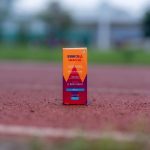Maltodextrin is a simple carbohydrate that is rapidly absorbed by the body and converted into energy.
Energy Gel Blueberry (pack of 6)
₹590.00 ₹684.40 Inc GST
Enerjiva Energy gels provide a quick shot of energy with their unique scientific mix of maltodextrin, fructose, BCAAs and sea salt and keep you fuelled throughout your activity. Designed to be consumed on-the-go, Enerjiva energy gel’s buzzing Blueberry flavour will keep your tase buds excited and instantly energize your running, cycling, swimming, gym and other physical activities.
Frequently Bought Together
-

Energy Gel Blueberry (pack of 6)
₹590.00₹684.40Inc GST -

Energy Gel Vanilla (pack of 6)
₹590.00₹684.40Inc GST
Description
Leucine is an essential amino acid for protein synthesis. Additionally, similarly to other amino acids, the carbon skeleton of leucine can be used to generate ATP. However, leucine can also regulate several cellular processes such as protein synthesis, tissue regeneration, and metabolism.
Leucine is a branched-chain amino acid that is critical for protein synthesis and muscle repair. It may decrease muscle soreness by reducing damage in exercised muscles and may also help reduce exercise-induced fatigue, can help prevent muscle wasting or breakdown.
Potassium is a major intracellular cation, regulates water balance, critical for neurotransmission, regulates muscle contraction, plays crucial role in heart function and critical for regulating blood pressure and blood pH.
Isoleucine a type of BCAA, BCAAs are mostly broken down in the muscle, rather than in the liver. Because of this, they are thought to play a role in energy production during exercise.
Isoleucine is involved in muscle metabolism and is heavily concentrated in muscle tissue. It may decrease muscle soreness by reducing damage in exercised muscles and may also help reduce exercise-induced fatigue, can help prevent muscle wasting or breakdown. It’s also important for immune function, hemoglobin production and energy regulation.
Valine a type of BCAA, BCAAs are mostly broken down in the muscle, rather than in the liver. Because of this, they are thought to play a role in energy production during exercise.
Valine helps stimulate muscle growth and regeneration and is involved in energy production. It may decrease muscle soreness by reducing damage in exercised muscles and may also help reduce exercise-induced fatigue, can help prevent muscle wasting or breakdown.
Bodily hydration is one of the best indicators of fitness in athletes, and sweat rates are often a limiting factor for performance. High sweat rates can result in dehydration, loss of fluid, electrolytes, muscle cramps, and fatigue. The intensity of performance and sweat rate are the determining factors to electrolyte imbalance. The main electrolytes include sodium, potassium, magnesium, and chloride.
Sodium, which is an osmotically active cation, is one of the most important electrolytes in the extracellular fluid, responsible for maintaining the extracellular fluid volume, and also for regulation of the membrane potential of cells. Sodium is exchanged along with potassium across cell membranes as part of active transport, aids in fluid retention, assists in transmission of nerve impulses, regulates osmotic pressure and is involved in muscle contraction.
Chloride is an extracellular anion, regulates osmotic pressure, regulates body fluids, regulates electrolyte balance and regulates acid-base status.
Calcium plays a pivotal role in the regulation of energy metabolism, Intracellular Ca(2+) plays a key regulatory role in adipocyte lipid metabolism and triacylglycerol storage; increased intracellular Ca(2+) results in the stimulation of lipogenic gene expression and lipogenesis and the suppression of lipolysis, which results in increased lipid filling and increased adiposity. Moreover, the increased calcitriol produced in response to low-calcium diets stimulates adipocyte Ca(2+) influx and, consequently, promotes adiposity, whereas higher-calcium diets inhibit lipogenesis, inhibit diet-induced obesity in mice, and promote lipolysis, lipid oxidation, and thermogenesis.
Caffeine boosts energy levels. Caffeine, a central nervous system stimulant that is known for its ability to fight fatigue and increase energy levels. Caffeine blocks the receptors of a neurotransmitter called adenosine, and this increases levels of other neurotransmitters in your brain that regulate your energy levels, including dopamine
Exhaustive exercise increases ROS production, leading to muscle fiber damage, which eventually results in muscle fatigue. Citric Acid is an antioxidant that protect cells from ROS-induced oxidative stress.
Additional information
| Flavor | Banana, Black, Blueberry |
|---|


0.0 Average Rating Rated (0 Reviews)